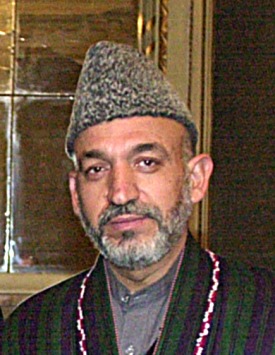Sources say that last week US Ambassador to Afghanistan Karl Eikenberry met with President Hamid Karzai to pressure him to come to some sort of political settlement with his chief rival in last month’s election Abdullah Abdullah. The ambassador also passed along a message from Secretary of State Hillary Clinton cautioning Karzai not to declare victory.
 Though the Karzai-appointed Independent Election Commission (IEC) seems poised to hand Karzai a big enough majority of the vote in the hotly disputed election to avoid a run-off, the Election Complaints Commission (ECC) that has been monitoring reports of fraud has determined that there was fraud on a massive scale in the election, and that seems to have played no small role in Karzai’s “victory.”
Though the Karzai-appointed Independent Election Commission (IEC) seems poised to hand Karzai a big enough majority of the vote in the hotly disputed election to avoid a run-off, the Election Complaints Commission (ECC) that has been monitoring reports of fraud has determined that there was fraud on a massive scale in the election, and that seems to have played no small role in Karzai’s “victory.”
Karzai reportedly did not respond favorably to Ambassador Eikenberry’s comments, and has refused to meet with any US officials since. Though the US has publicly put on a brave face with respect to the vote, and Richard Holbrooke has repeatedly praised it, privately it is becoming increasingly apparent that it is putting them in an awkward position.
The Karzai government has so far remained defiant over the complaints, with Karzai accusing the US of inventing the reports to undermine him and his Interior Minister Hanif Atmar threatening to “break the teeth” of anyone who tries to protest.
But while Abdullah Abdullah has rejected the idea of protests as were seen following June’s contested vote in neighboring Iran, some powerful supporters of his are saying Afghans have every right to protest if they want to, and it seems that many want to.
Already losing a war against the Taliban, the US government would hardly like to see major political unrest in the nation mucking up their endless war, they can hardly afford to back a Karzai crackdown on protesters, particularly after their public condemnation of such a move in Iran. This has left them scrambling to try to force a settlement onto the situation before it gets out of hand. But with Abdullah rejecting offers of a unity government before, and Karzai rejecting calls to talk now, it seems the US is the only one eager to see a return to something closely resembling the status quo.


